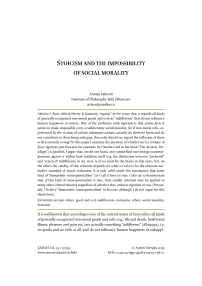Stoicism and the impossibility of social morality
Автор: Seregin Andrei
Журнал: Schole. Философское антиковедение и классическая традиция @classics-nsu-schole
Рубрика: Статьи
Статья в выпуске: 1 т.13, 2019 года.
Бесплатный доступ
Stoic ethical theory is famously “rigorist” in the sense that it regards all kinds of generally recognized non-moral goods and evils as “indifferents” that do not influence human happiness or misery. One of the problems with rigorism is that prima facie it seems to make impossible even a rudimentary social morality, for if non-moral evils, experienced by the victims of various inhumane actions, actually do them no harm and do not contribute to their being unhappy, then why should we regard the infliction of these evils as morally wrong? In this paper I examine the question of whether such a critique of Stoic rigorism (put forward, for example, by Claudia Card in her book “The Atrocity Paradigm”) is justified. I argue that, on the one hand, one cannot find convincing counterarguments against it within Stoic tradition itself (e.g, the distinction between “preferred” and “rejected” indifferents, in my view, is of no avail for the Stoics in this case), but, on the other, the validity of this criticism depends on what we take to be the ultimate normative standard of moral evaluation. It is only valid under the assumption that some kind of “humanistic consequentialism” (as I call it here) is true. I also try to demonstrate that, if this kind of consequentialism is true, then similar criticism may be applied to many other ethical theories regardless of whether they endorse rigorism or not. (Personally, I believe “humanistic consequentialism” to be true, although I do not argue for this thesis here).
Ancient ethics, good and evil, indifferents, normative ethics, social morality, stoicism
Короткий адрес: https://sciup.org/147215817
IDR: 147215817 | DOI: 10.25205/1995-4328-2019-13-1-58-77
Список литературы Stoicism and the impossibility of social morality
- https://nsu.ru/classics/schole/13/13-1-seregin.pdf
- Barney, R. (2003) "A Puzzle in Stoic Ethics", Oxford Studies in Ancient Philosophy 24, 303-340.
- Brennan, T. (2005) The Stoic Life. Emotions, Duty, and Fate. Oxford: Clarendon Press.
- Card, C. (1998) "Stoicism, Evil and the Possibility of Morality", Metaphilosophy 29.4, 245-253.
- Card, C. (2002) The Atrocity Paradigm. A Theory of Evil. New York: Oxford University Press.
- Cooper, J.M. (2004) "Stoic Autonomy", in J.M. Cooper, Knowledge, Nature, and the Good. Essays on Ancient Philosophy. Princeton & Oxford: Princeton University Press, 204-246.
- Coyle, S. (2014) Modern Jurisprudence. A Philosophical Guide. Oxford & Portland, Oregon: Hart Publishing.
- Cumberland, R. (1720) De legibus naturae disquisitio philosophica. Dublini: Typis Jacobi Carson.
- Forschner, M. (1981) Die stoische Ethik: über den Zusammenhang von Natur-, Sprach- und Moralphilosophie im altstoischen System. Stuttgart: Klett-Cotta.
- Frede, M. (1999) "On the Stoic Conception of the Good", in K. Ieradiakonou (ed.), Topics in Stoic Philosophy. Oxford: Clarendon Press, 71-94.
- Gill, C., tr. (2013) Marcus Aurelius. Meditations. Books 1-6. Oxford: Oxford University Press.
- Hart, H.L.A. (1986) "Who Can Tell Right from Wrong?" New York Review of Books 33.12 (17 July 1986).
- Inwood, B. (1985) Ethics and Human Action in Early Stoicism. Oxford: Clarendon Press. Irwin, T. (1998) "Stoic Inhumanity", in J. Sihvola, E. Troels-Pedersen (ed.), The Emotions in Hellenistic Philosophy. Dordrecht: Springer-Science Business Media, 219-242.
- Irwin, T. (2007) The Development of Ethics. Vol. I: From Socrates to the Reformation. New York: Oxford University Press.
- Janaway C., tr. (2009) Arthur Schopenhauer. The Two Fundamental Problems of Ethics. Cambridge: Cambridge University Press.
- Klein, J. (2015) "Making Sense of Stoic Indifferents", Oxford Studies in Ancient Philosophy 49, 227-282.
- Lesses, G. (1989) "Virtue and the Goods of Fortune in Stoic Moral Theory", Oxford Studies in Ancient Philosophy 7, 95-127.
- Moore, G.E. (2005) Ethics. New York: Oxford University Press.
- Nussbaum, M.C. (1995) "Emotions and Women's Capabilities", in M.C. Nussbaum, J. Glover (ed.), Women, Culture and Development. Oxford: Clarendon Press, 360-395.
- Parkin, J., ed. (2005) Richard Cumberland. A treatise of the laws of nature. Translated, with introduction and appendix by John Maxwell (1727). Indianapolis: Liberty Fund, Inc.
- Pohlenz, M. (1939) "Plutarchs Schriften Gegen die Stoiker", Hermes 74.1, 1-33.
- Schneewind, J.B. (1998) The Invention of Autonomy: A History of Modern Moral Philosophy. Cambridge: Cambridge University Press.
- Striker, G. (1996) "Following nature: A study in Stoic ethics", in G. Striker, Essays on Hellenistic Epistemology and Ethics. Cambridge University Press, 221-280.
- White, N.P. (1990) "Stoic values", The Monist 73.1, 42-58.
- Wynne, J.P.F. (2012) "God's indifferents: Why Cicero's Stoic Jupiter made the world", Apeiron 45.4, 354-383.


